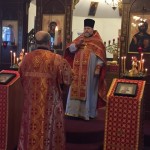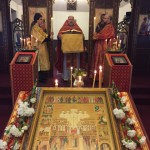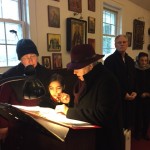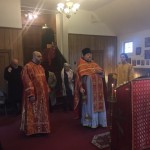On February 5, on the Sunday of the Publican and Pharisee, as well as the feast of the New Martyrs and Confessors of the Russian Church, our parish family held a beautiful celebration. The Rector of St. George Church, Archpriest Igor Tarasov served the Divine Liturgy in our temple. Following the Scripture readings he delivered a homily in English:
“Today’s Sunday is supposed to prepare us for the blessed and saving time of Lent. We heard the parable of the Publican and Pharisee, about the two different men. Today we also celebrate a commemoration of the New Martyrs and Confessors of the Russian Church. Thus we had two lessons from the Holy Gospel.”
“The first Gospel lesson is telling us about two men who came to the Temple to pray. All about them was different. Their social status and their moral reputation were different. Their prayers were different also. And the outcome of their prayers was totally different. One of them went down to his house justified, yet another did not. We would think using our human logic that God blessed the one who was considered morally upstanding. And not justified would be the one who is despised as a public sinner. But our Lord Jesus Christ reverses the expected conclusion. God’s reasoning is different from the man’s logic. In the eyes of God the publican is justified because of his humility. The Pharisee is condemned because of his pride.”
“If we try to evaluate those two men, let us listen to their prayers. The Pharisee states with satisfaction that he is not like other men – extortioners, unjust, adulterers. He is not lying. He behaves better than those bad people. He further states that he fasts twice a week. Very well, we are supposed to do the same, but who knows whether we actually fast on Wednesdays and Fridays. The Pharisee also tells that he gives tithes of all he possesses. This is much more than most of us do. No parishioner of this church gives tithes meaning 10 percent to his parish. Therefore, we must say that the Pharisee appears to be a much better person that most of us are.”
“As to the publican, he appears to be worse than most of us. As we mentioned last Sunday, the publicans, or tax collectors were public sinners, crooks, extortioners, corrupted criminals, cheaters of the people and collaborators with the Romans. They committed many crimes and offended many people. Most of us are not so evil. Yet that kind of man, a despised evildoer, went down to his house justified.”
“Despite that the Pharisee was a public just man and the tax collector was a public sinner, God judged them in the opposite way. The reason of such an outcome is the attitude those two men had. The Pharisee was proud. He prayed, but his prayer was so preoccupied with his own goodness that he forgot about God. He actually talked to himself, not to God, in his prayer. He praised himself. And he judged others, particularly the publican. All that attitude of self-righteousness, self-exaltation and judging the others condemned him. The publican’s attitude was the opposite. He is aware of his indignity. His posture, his words of prayer express deep humility and contrition. God loves this kind of attitude. He does because it is the most fair and honest understanding of our human nature, our abilities and our position. Our nature is imperfect and corrupt. Our abilities are limited, and we are often inclined to sin. Our position is much lower than God’s position. Therefore, we need not to be proud and self-exalting. We need to be honest with ourselves and acknowledge our weakness, imperfection and evil propensities, as well as our evil deeds committed in the past. Then we will be exalted by God. The publican did and became justified. God opposes the proud, but exalts the humble.”
“Therefore, dear brothers and sisters, let us avoid pride and self-exaltation of the Pharisee and let us imitate humility of the publican, so we will be blessed and justified in the fairest eyes of God.”
“Let us also imitate the publican in his repentance. After finishing our celebration of Christmas and Theophany we keep hearing about repentance. This was the main theme of the first preaching of Christ. We need to repent because we are sinful people. And in another spiritual aspect, when we commemorate Holy New Martyrs and Confessors of the Russian Church, we need to repent because so many persons among the members of our community, of the Church of Rus’, were persecuted. The sad historical experience of our Church calls us for repentance. Of course, most of us did not persecute and did not hurt those holy people. But, unfortunately, it is a fact that our ancestors in our old country, at least most of our ancestors, were either the persecutors or the persecuted ones. Those of us who were born in the old country are the heirs of either New Martyrs of Rus’ or their adversaries. And that calls for repentance, not for a pride. It may be heard now that many Russians are proud of their Soviet past. It is sad. Of course, there were the acts of heroism among the Soviet people, however our attitude must be of humility and repentance for the godless past, and not an attitude of pride. Therefore, dear brothers and sisters, let us imitate the repentance of the publican, his humility and awareness of his sins and not the Pharisee with his pride.”
During the time of the preparation for the Holy Communion the choir prayerfully performed the hymns from the Lenten Triodion which begin to be sung on this Sunday, starting with the words “The door of repentance open to me, o Giver of life…”. After those hymns the singers also sung the hymns dedicated to the New Martyrs and Confessors of Rus’.
Following the Ambo Prayer the Rector performed a memorial service (Litia) to commemorate all the deceased who suffered during the time of godless persecutions.
After the Liturgy dismissal the Rector preached a brief sermon in Russian stressing the main points of his English homily.




